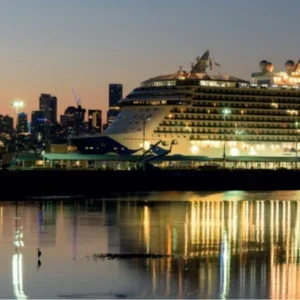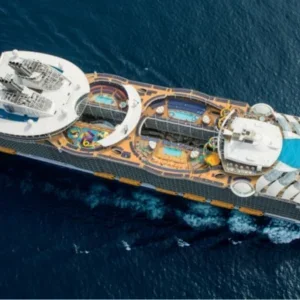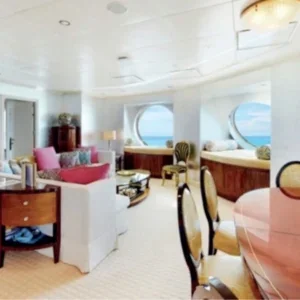In the past, the cruise industry’s process for reviewing operations management and formulating new ways to improve passenger experience has been retrospective; indeed, the traditional approach in many industries is to plan ahead by looking backwards. There is wisdom in this method, but the advent of AI has brought the capability to respond in real time and, crucially, predict events before they happen.
According to Carnival, AI is about to revolutionise the passenger experience on its largest ship, the Regal Princess, as well as the Ruby Princess, Royal Princess and, later this year, the Coral Princess.
On each of these vessels, guests will be able to experience first-hand the benefits of the technology through a wearable device – the Ocean Medallion.
Sent to their home preprogrammed with their name, the name of the ship on which they will travel and its sail date, passengers can use the Ocean Medallion to set up a travel profile, giving the AI system useful data about the kind of cruise experience they are seeking. When guests arrive at the port, they are greeted by name and there is no need to queue to check in. A ‘tagalong’, an avatar of their choosing that is unique to each passenger, welcomes them at the gangway and the personalised experience begins.
“Every touchpoint is personalised,” says John Padgett, chief experience and innovation officer at Carnival. “The AI comes in through the screens and portals that are all over the ship, including interactive displays in the elevators and the lobby. These show guests what is going on at any given time during the journey. Because the system knows each guest’s preferences before they arrive, the AI can create suggestions for experiences that they might not be aware of.”
Strategy trumps technology
When any new technology arrives, it is tempting to embrace it before its implications and benefits are fully understood. Adopting technology for its own sake is a mistake many businesses have made, one that can prove costly. Carnival was keen to avoid this, claiming that its approach to AI is rooted firmly in an understanding of what passengers need.
Indeed, Padgett has a strong track record when it comes to wearable devices. He designed the MagicBand for Disney, which stores profiles of visitors to the company’s theme parks so that they can interact seamlessly with their environment. From this experience, he perceived that strategy must come before the adoption of any new technology – understand what experience you want to deliver, and it becomes easier to identify the tools in which you need to invest.
“AI is fundamental to what we are doing but is part of a bigger strategy,” he remarks. “Everything works as part of a larger ecosystem to which every piece of technology contributes. The strategy is one of experience maximisation. For our guests, time is the most important element of their vacation.
“Time is valuable beyond belief, so we aim to increase the value of passengers’ time through the increased personalisation of experiences and by eliminating any of the hassle that usually comes with the cruising experience. The result is more high value experiences for our guests. The important thing is that this strategy comes first, not the technology; for us, technology enables strategy.”
The Ocean Medallion is a step beyond the MagicBand, using AI to help guests plan and personalise their experience. It is intended to create an experience on Carnival’s most advanced ship that goes back to the roots of the industry, when personal service was the key experience for cruise ship passengers.
It is not, however, viewed as technology, even though the Ocean Medallion is a sophisticated device. It has no on-off switch and no inputs. It connects guests to the ship’s technological ecosystem but in a passive way that requires no activation by the user. According to Carnival, the Ocean Medallion provides a democratised service for everyone, not an elite service, and is built on the readouts from over 7,000 sensors and 4,000 portals on the ship that guests do not see or interact with directly.
“We want the technology to disappear from view,” explains Padgett. “The Ocean Medallion uses MagicBand, which was designed to take the friction out of the guest experience, as a baseline and adds personalisation at scale.
“Could this be done using an app on a phone? Yes, but with the Ocean Medallion, everyone has one – including kids – and you can bury it in the sand or leave it in the sun and it won’t be affected. Also, it doesn’t have to adapt to different operating systems because the crew is connected to the ship using the same device; everyone has the same ubiquitous connection.”
The device not only connects guests to their on-board environment, it also benefits from AI doing what it does best – learning.
“The Ocean Medallion creates intelligence that can be used in real time to personalise the customer experience,” says Padgett. “The system starts with what guests say they are interested in, but what they actually engage in on the ship will shape their profiles. A traditional model has a static view of each guest, so that is where the AI comes in – it reacts to real-time data.”
The number of question that MSC Cruises’s voiceactivated personal assistant ZOE can answer.
Out in front and behind the scenes
The Ocean Medallion is far from the only passenger facing use of AI. MSC Cruises, for example, has developed a digital platform that enables faster check-in and provides apps to improve passenger experience – the MSC for Me app, public interactive screens, cabin televisions and a wearable bracelet all help to enhance on-board experiences. MSC has also introduced a voice-controlled, AI guest service called ZOE.
Akin to Amazon's Alexa, the system is voice activated with the words ‘Okay Zoe’, and capable of answering over 800 standard questions about the cruise and the services on offer during the trip. ZOE can also make suggestions about on-board activities, book restaurant reservations, play music and connect passengers to the ship’s staff. And, crucially, it is designed to continuously learn from guest interactions in order to hone its responses. Located in every stateroom, ZOE, first launched on MSC Bellissima and set to feature on every MSC ship, is hailed as the world's first virtual personal cruise assistant to use AI.
Other operators are also looking to use AI behind the scenes, seeing it as much as a tool for operations management as for passenger interaction.
Costa Cruises, for instance, is using enhanced data analysis to predict and analyse water usage on its ships. This goes hand in hand with the operator’s use of passenger-facing technologies, such as multilingual robots to help passengers find their way around the ship. The unit, known as Pepper, was introduced in 2016 and is able to not only recognise human emotions, but also proactively interact with its environment.
Carnival, through its Ocean Medallion, is also using AI to help manage operations in ways that do not involve direct interaction with passengers.
“We have had no problems with the adoption of Ocean Medallion and guests have overwhelmingly embraced it,” says Padgett. “It also allows us to learn. The crew is always connected, so we have a real-time view from an operations standpoint. We know about any technical issues that could affect operations in real time.
“We even use AI to predict if a problem might arise in the future, so we can make sure it doesn’t,” he adds. “For instance, if there are constraints on the computing resource on the ship, then we could shift some resources to the cloud or manage between the data centres on the ship and onshore.”
AI is undoubtedly full of promise for enhancing the passenger experience and managing operations more efficiently. Even so, its ability to deliver on its promise depends on whether it is used as part of a clear strategy of personalisation, operations management and predictive analysis, or just as a flashy new piece of tech.






